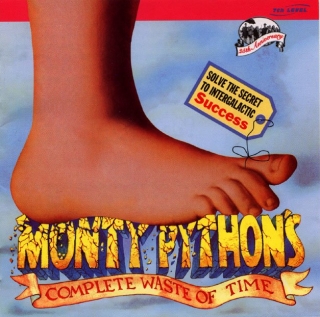Top Qs
Timeline
Chat
Perspective
Monty Python's Complete Waste of Time
1994 video game From Wikipedia, the free encyclopedia
Remove ads
Monty Python's Complete Waste of Time is a collection of minigames, screensavers, desktop wallpaper and icons for Mac OS System 7 and Windows released in 1994 by 7th Level, Inc. It was brought on board the Mir Space Station by astronaut Andy Thomas.[3]
Remove ads
Gameplay
Summarize
Perspective
Monty Python's Complete Waste of Time is a point-and-click experience in absurdity and irreverence, emulating the anarchic spirit of the original British comedy series. Created with input from Terry Gilliam, the game is a digital playground filled with references to TV sketches, bizarre animations, and unpredictable interactions. Players explore surreal environments like the Exploratorium, Exploding TV Room, and Portrait Gallery, where clicking on anything might trigger a classic skit like the "Dead Parrot," a strange animation, or even land the player in a penalty box with cheesy music and no clear escape. The game parodies multimedia seriousness, offering a mess of nonsense instead. It also offers a few structured elements, including: the Desktop Pythonizer which lets users decorate their screen with squiggly icons and themed screen savers; arcade-style mini-games which involve dodging flying pigs and their deadly droppings; and a hidden puzzle called the "Secret to Intergalactic Success," which players must uncover and solve on their own, with the promise of prizes like a multimedia PC or $5,000. Even the help button is a joke, offering gags instead of guidance—like a voice explaining that "Help!" was a Beatles song. Overall, the game is a satirical, interactive tribute to Monty Python's legacy, designed more for laughs than logic.[4]
Remove ads
Development
The Mac version of the game was released in October 1995.[5]
Reception
Reception
MacUser named Complete Waste of Time one of 1996's top 50 CD-ROMs, and gave it a score of 4.5 out of 5.[6]
Games Domain said "All in all, if you are just looking to kill some time and have some fun, this product fits the bill".[7]
In 1995, it won the Codie award for "Best Strategy Program" from the Software Publishers Association.[8]
Sales
The game shipped more than 50,000 units worldwide by December 1994[1] and generated over $7 million in revenue.[9]
References
External links
Wikiwand - on
Seamless Wikipedia browsing. On steroids.
Remove ads

